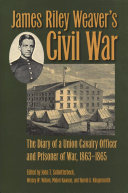

Most ebook files are in PDF format, so you can easily read them using various software such as Foxit Reader or directly on the Google Chrome browser.
Some ebook files are released by publishers in other formats such as .awz, .mobi, .epub, .fb2, etc. You may need to install specific software to read these formats on mobile/PC, such as Calibre.
Please read the tutorial at this link: https://ebookbell.com/faq
We offer FREE conversion to the popular formats you request; however, this may take some time. Therefore, right after payment, please email us, and we will try to provide the service as quickly as possible.
For some exceptional file formats or broken links (if any), please refrain from opening any disputes. Instead, email us first, and we will try to assist within a maximum of 6 hours.
EbookBell Team

4.8
34 reviews666 days of diary entries documenting the life of a Union officer held in Confederate prisons
Captured on October 11, 1863, James Riley Weaver, a Union cavalry officer, spent nearly seventeen months in Confederate prisons. Remarkably, Weaver kept a diary that documents 666 consecutive days of his experience, including not only his life in a series of prisons throughout the South, but his precaptivity cavalry duties, and his eventual return to civilian life. It is an unparalleled eyewitness account of a crucial part of our history.
Weaver's observations never veer into romanticized descriptions; instead, he describes the "little world" inside each prison and outdoor camp, describing men drawn from "every class of society, high and low, rich and poor, from every country and clime." In addition, Weaver records details about life in the Confederacy that he gleans from visitors, guards, new arrivals, recaptured escapees, Southern newspapers, and even glimpses through windows.
As the editors demonstrate, Weaver's diary-keeping provided an outlet for expressing suppressed emotions, ruminating on a seemingly endless confinement that tested his patriotism, religious faith, and will to survive. In the process, he provides not only historically important information but also keen insights into the human condition under adversity.